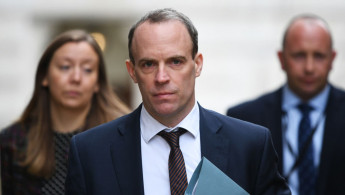Yemen has 'never looked more likely to slide into famine', warns UK foreign secretary
The UK’s foreign secretary Dominic Raab warned on Thursday that Yemen has “never looked more likely to slide into famine.”
Whilst on an visit to the United States, Raab warned the humanitarian situation in Yemen is rapidly deteriorating and the war-torn country now more than ever at risk of mass starvation.
Speaking at a special meeting convened by the UK, Germany, Kuwait and Sweden ahead of this month’s UN General Assembly, Raab cautioned that humanitarian funding for non-government organisations and United Nations agencies is now catastrophically low.
This year, he said, the UN has only received just over 30% of what it needs to help those who depend on aid for their survival.
“The humanitarian situation in Yemen is now the worst it has ever been, and compounded with the threat of coronavirus, the country has never looked more likely to slide into famine,” he said.
“Unless donors urgently act now and follow through on their pledges, hundreds of thousands of people are at risk of dying simply from starvation.”
Raab called on the UN to work to find a political solution to the conflict in Yemen, which has left the country suffering a humanitarian disaster.
Read also: Will UAE-Israel deal draw Tel Aviv into Yemen's war?
“We also need to see unwavering support for Special Envoy Martin Griffiths’ plans to secure a ceasefire that ends the suffering.”
The UK’s Foreign Secretary announced on Thursday £5.8 million of new UK aid to help avert a famine in Yemen, taking the UK’s total contribution since the conflict began to over £1 billion.
London says its support will help at least 500,000 vulnerable people to buy food and household essentials including soap and medicines each month.
Half a decade of war
Yemen is divided between Houthi rebels in the north and an internationally recognized government in the south. Both sides have been at war since the Iran-backed Houthis swept across much of the north and seized the capital of Sanaa late in 2014, forcing the government of President Abed Rabbo Mansour Hadi into exile.
In Mach 2015, Saudi Arabia and other Gulf states formed a coalition to take on the Houthis in what they said was an effort to stop Iran’s growing sway in Yemen, which is at the southern corner of the Arabian Peninsula overlooking the Red Sea and the Arabian Sea.
The conflict has killed more than 100,000 people and created the world’s worst humanitarian disaster, with more than 3 million people internally displaced and two-thirds of the population relying on food aid for survival.
Follow us on Facebook, Twitter and Instagram to stay connected





 Follow the Middle East's top stories in English at The New Arab on Google News
Follow the Middle East's top stories in English at The New Arab on Google News


